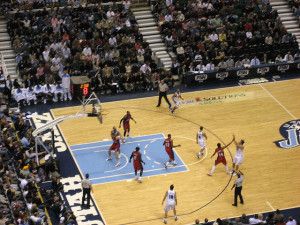The chances of any one of us becoming rich and famous are pretty slim. But did you ever wonder what it would be like to work for a celebrity, like a professional athlete? Joe McLean, managing partner of Intersect Capital, played professional basketball for four years, and now advises players and coaches in the NBA, NFL, PGA, MLB and NASCAR.
His insights are surprising and fascinating. For one thing, professional athletes are vulnerable in ways most people don’t imagine.
“Professional athletes are super accessible,” notes McLean, “they need to be constantly protected because trouble may just be waiting for them in the tunnel right after the game.” And, it should be stated that such dangers cut across sports, economic backgrounds and, yes, race.
McLean offers the example of an NBA player coming off the court after a game. He’s approached, unsolicited, by a man with a diamond pendant, who says he made it just for the athlete and thrusts it into his pocket saying, “Just take it.” The athlete does and, lo and behold, three weeks later gets an invoice for the price of the pendant.
* * *
The key to getting through to many professional athlete clients is “learning to say ‘no,’” McLean says. Though it sounds ridiculous, many will be hearing that word for the first time and though they may not take it well at first, the advisor’s dissenting voice will stick out. . . .
It’s also important to learn how to say “no” without actually saying “no.” After all, by simply second-guessing every request, the client will eventually tune you out. “Setting purchasing goals is an easy way to control spending,” McLean says. “Instead of telling a client that he shouldn’t buy a third car, tie it into an achievement, like being named rookie of the month.” This method helps attribute some value to the purchase—athletes can fall into the trap of thinking of their money as simply numbers on a page—and can help lessen impulse spending.
See the entire article at WealthManagement.com.
Photo credit: argyleist






 LinkedIn
LinkedIn Twitter
Twitter RSS
RSS GooglePlus
GooglePlus